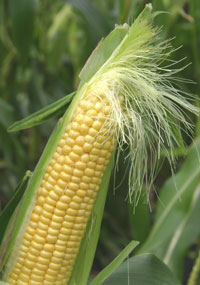Corn Silk
From Wikiwel
Other Names: Barbe de Maïs, Blé d’Inde, Cheveux de Maïs, Indian Corn, Maidis Stigma, Maïs Violet, Maize Silk, Purple Corn, Seda de Maíz, Soie de Maïs, Stigma Maydis, Yu Mi Xiu, Zea, Zea mays.
Cornsilk is drawn from the stigmas of female corn plants. It has been used by native Americans for centuries as a natural remedy for many ailments and is still used today in several different applications. The long shiny fibers at the top of an ear of corn are called corn silk.
See also : Maize
Special Precautions of Corn Silk
- Corn silk can decrease potassium levels in the blood and can cause skin rashes, itching, and allergies.
- Pregnancy and breast-feeding: Corn silk is safe for pregnant women when used in the amounts normally found in food. But larger amounts are unsafe, because corn silk might stimulate the uterus and cause a miscarriage. Not enough is known about the safety of taking corn silk if you are breast-feeding. It’s best to stick to food amounts of corn silk if you are pregnant or breast-feeding.
- Diabetes: There is some concern that large amount of corn silk might lower blood sugar. This could interfere with blood sugar control in people who have diabetes.
- High blood pressure or low blood pressure: Large amounts of corn silk might interfere with control of these conditions.
- Blood levels of potassium that are too low: Large amounts of corn silk might make these conditions worse.
- Corn allergy: Applying lotions that contain corn silk might cause a rash, red skin, and itchiness if you are allergic to corn silk, corn pollen, or cornstarch.
- Medications for diabetes (Antidiabetes drugs) interacts with CORN SILK
- Medications for high blood pressure (Antihypertensive drugs) interacts with CORN SILK
- Medications for inflammation (Corticosteroids) interacts with CORN SILK
- Warfarin (Coumadin) interacts with CORN SILK
- Water pills (Diuretic drugs) interacts with CORN SILK
Health Benefits and uses of Corn Silk are
Corn silk contains proteins, carbohydrates, vitamins, minerals, and fiber. It also contains chemicals which might work like water pills (diuretics), and it might alter blood sugar levels, and help reduce inflammation.
- Urinary Tract Treatment : The cornsilk herb is a soothing diuretic that can benefit the urinary tract in numerous ways. It can be given to children as a method of treating enuresis--more commonly known as bed wetting. It is also a common alternative to antibiotics when treating a urinary infection resulting from bacteria. Excessive use of antibacterial medications can lead to bacterial resistance to these medications, and complications can arise in children who take pharmaceutical medications. Cornsilk consumption also helps treat inflammation in the bladder or urethra. Cornsilk is usually taken by steeping 2 tsp. of the herb in boiling water for 10 to 15 minutes. You can drink this tea up to three times daily. Cornsilk tinctures are an alternative--3 to 6 ml of tincture should be taken three times daily.
- Kidney and Circulation : Cornsilk is sometimes used to treat and prevent the development of kidney stones in adults. Infections of the kidney can also be treated by taking cornsilk daily. Because of its affect on the kidneys, research indicates that the herb can help lower high blood pressure in the circulatory system.
- Demulcent properties.
